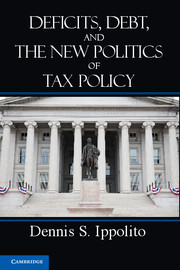Book contents
- Frontmatter
- Contents
- Figures and Tables
- Preface
- 1 A Brief History of Federal Taxation
- 2 The Stable Era – World War II to the 1960s
- 3 Destabilizing Tax Policy – Vietnam and the 1970s
- 4 The Reagan Strategy – Balancing Low
- 5 The Clinton Strategy – Balancing High
- 6 Bush, Obama, and Fiscal Deadlock
- 7 Reconnecting Taxes and Budgets
- Index
- References
5 - The Clinton Strategy – Balancing High
Published online by Cambridge University Press: 05 December 2012
- Frontmatter
- Contents
- Figures and Tables
- Preface
- 1 A Brief History of Federal Taxation
- 2 The Stable Era – World War II to the 1960s
- 3 Destabilizing Tax Policy – Vietnam and the 1970s
- 4 The Reagan Strategy – Balancing Low
- 5 The Clinton Strategy – Balancing High
- 6 Bush, Obama, and Fiscal Deadlock
- 7 Reconnecting Taxes and Budgets
- Index
- References
Summary
During the early 1990s, the deficit problem appeared to have grown worse. The FY 1990 deficit of $221 billion matched the largest deficit of the Reagan years, and the $290 billion FY 1992 deficit set a new record. In fact, a dramatic fiscal turnaround was soon underway, as a nearly three-decade-long streak of consecutive deficits ended in 1998. Two years later, the budget surplus was more than $236 billion, and the Congressional Budget Office (CBO) budget outlook projected surpluses of more than $4.6 trillion over the next decade.
The policy key to this reversal was contained in two multiyear reconciliation bills. The Omnibus Budget Reconciliation Act of 1990 (OBRA 1990), passed by a Democratic Congress and signed by President George H. W. Bush, was a nearly $500 billion deficit-reduction package of tax increases, spending cuts, and budget enforcement provisions. The Omnibus Budget Reconciliation Act of 1993 (OBRA 1993), engineered by President Bill Clinton, was unanimously opposed by congressional Republicans. It, too, increased taxes and by considerably more than the 1990 budget agreement. OBRA 1993 also included spending cuts and budget enforcement provisions as part of its approximately $500 billion in deficit reduction for fiscal years 1994–1998.
- Type
- Chapter
- Information
- Deficits, Debt, and the New Politics of Tax Policy , pp. 157 - 195Publisher: Cambridge University PressPrint publication year: 2012



